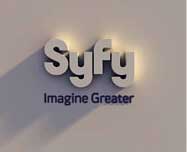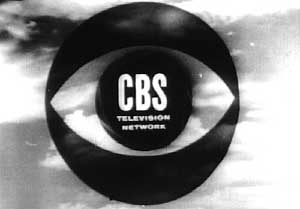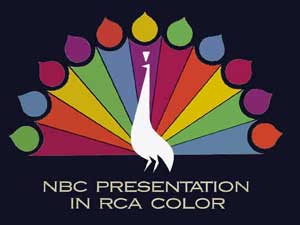[The site redesign is about a month away, and I'm still Smothers-ing. But the veteran army of TV critics and experts hopping aboard TV WORTH WATCHING is about to grow, and I couldn't be more excited or proud. As a taste of things to come, here's the first salvo from one of our new contributors: veteran TV critic and editor P.J. Bednarski.
His impressive credentials appear at the bottom of this blog. But first, here's his take on Sci Fi Channel's recently announced name change, to Syfy. Please read, and enjoy, and welcome him to the fold. I've known the guy for decades, and he's terrific...]
Sci Fi to Syfy: Wy O Wy?
By P.J. Bednarski
 You may have read Stuart Elliott's advertising column in The New York Times Monday (3/16), in which he reported that in July the Sci Fi Channel will rename itself -- or respell itself, I guess -- and become Syfy. The trouble, as Elliott relates, is that executives concluded spelling Sci Fi like that was limiting -- Sci Fi, the channel, is also about superheroes and reality shows, which are, in their minds, just cousins of science fiction. Also, you can't trademark it, because Sci Fi is a genre.
You may have read Stuart Elliott's advertising column in The New York Times Monday (3/16), in which he reported that in July the Sci Fi Channel will rename itself -- or respell itself, I guess -- and become Syfy. The trouble, as Elliott relates, is that executives concluded spelling Sci Fi like that was limiting -- Sci Fi, the channel, is also about superheroes and reality shows, which are, in their minds, just cousins of science fiction. Also, you can't trademark it, because Sci Fi is a genre.
They say television is a business of C students, and if so, then maybe marketing is too, because it rewards spelling things incorrectly. (They're See students?)
But Syfy is not alone...
Discovery Communications execs get prickly rashes whenever anyone refers to TLC as The Learning Channel, though once it was quite proud of that designation. No more. It's TLC, and it stands for nothing, and that allows TLC to be as stupid as it wants to be.
NBC Universal, which owns Sci Fi, also owns Oxygen and Bravo, which both used to be something they now aren't. And that's apparently a good thing.
 I was thinking about this. Scripps Networks owns something it once called the Fine Living Network, an "aspirational" channel that once put on programs about fine wine, yachts, fabulous architecture and other stuff that made you start talking like Robin Leach. Now Fine Living mainly has a schedule of reality shows, including one series called Bulging Brides. Definitely not aspirational.
I was thinking about this. Scripps Networks owns something it once called the Fine Living Network, an "aspirational" channel that once put on programs about fine wine, yachts, fabulous architecture and other stuff that made you start talking like Robin Leach. Now Fine Living mainly has a schedule of reality shows, including one series called Bulging Brides. Definitely not aspirational.
I have a little sympathy for Scripps. Fine Living Network doesn't fit with these hard times -- rich people are now trying to live like the hoi polloi -- so Fine Living had to swerve out of that line of work. Plus, the network heretofore flew under Madison Avenue's radar, but as of January, it's in 50 million homes and is now getting rated by Nielsen, so it needs to score some points.
It is however, unfortunate that FLN is also the way the National Liberation Front of both Algeria and Burundi refer to themselves.
Think about some other cable networks. If ESPN wasn't so successful, you'd think they'd like to change their name, which once stood for Entertainment and Sports Network. (Why not the Cover Your Ass Network, or CYAN?)
Nickelodeon is named for a device none of its viewers, nor most of its viewers' parents, have ever heard of. VH1 seems to have been a thoughtless name for MTV's second channel, as if somebody wrote it on a napkin and a logo artist took it seriously.
Lifetime sounds sufficiently vague to be anything, which again, is a good thing. But it started out as a cable network that delved into health and medical topics; it doesn't make sense as a name for a women's network. Meanwhile, WE: Women's Entertainment sounds alternatively like a new medical condition or a dowdy campus service organization.
Before it became Spike (a name everybody thought was pretty stupid when it was announced, an opinion that hasn't budged), it was TNN. That once stood for The Nashville Network, but when Viacom bought it, it, too, stood for nothing. But why Spike? I never heard a satisfactory explanation, but Dude! wouldn't have been bad, and it would have probably played well with the fart-joke crowd.

Which gets us to the Big Three. CBS no longer stands for anything, but it once was the Columbia Broadcasting System. And NBC and ABC don't really mean anything, don't really say anything. All three are, on the Vague Name Indicator, nebulous enough that they can set their own course.
But each of the Big Three have iconic logos -- the CBS eye, the NBC peacock and the stylistic ABC dot -- and here's where the old broadcasters are out of sync with consumers. Those icons represent a culture, a history, a sense that these networks are institutions, which they are, and thank God.

But that doesn't matter much to the evolved viewing public that prefers brand marketing (something new!) rather than brand integrity (something with roots). That's not the reason broadcast networks are losing audience, but maybe it says something about how they differ from vast millions of viewers. They're traditional in an era where that is a mortal television sin.
Syfy it is.
----

P.J. Bednarski is officially "former," but definitely here and thinking and dreaming and dreadfully unaware of his real age. For the record, I'm former executive editor of Broadcasting & Cable, former editor of Elecronic Media, TV critic at USA Today at its inception, (when many believed it would be quickly gone), the Chicago Sun-Times (which I fear is nearly former, dammit), Cincinnati Post (no longer in existence) and Dayton Journal Herald (ditto). You can reach me at pjbnyc@optonline.net or paul.j.bednarski@gmail.com.